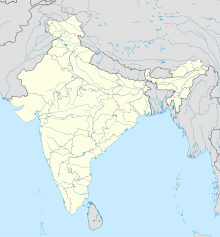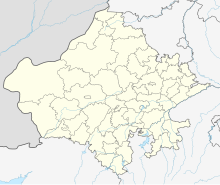Capture of Jhain
| Capture of Jhain | |||||||||
|---|---|---|---|---|---|---|---|---|---|
| |||||||||
| Belligerents | |||||||||
|
| Chauhans of Ranthambore | ||||||||
| Commanders and leaders | |||||||||
|
| Gurdan Saini † | ||||||||
| Strength | |||||||||
| 1,000 | 10,000 | ||||||||
| Casualties and losses | |||||||||
| Unknown | Unknown | ||||||||
Jhain on Map | |||||||||
The Capture of Jhain was a military expedition carried out by the Delhi Sultanate under Jalal-ud-din Khalji against the Kingdom of Ranthambore. It took place in the March of 1291 when the Delhi forces defeated the Ranthambore forces under Gurdan Saini and captured the city of Jhain.
Some sources say that the Delhi army consisted of around 1,000 men, while the Ranthambore forces had 10,000.[1] Most of the Rajputs, including their leader, Gurdan Saini, were killed in the battle.[2][3] Jalaluddin Khalji marched through Jhain after the victory of the battle. The remaining Rajputs in Jhain evacuated the fort and retreated.[4]
Background and aftermath
[edit]Jalal-ud-din Khalji became ruler of the Delhi Sultanate in 1290. He captured the Mandawar fort in 1291 after defeating the Rajputs.[5] After the victory at Mandawar, he marched towards Ranthambore to capture it from the Chauhans. Hammiradeva, the ruler of Ranthambore, sent his general Gurdan Saini to resist the invasion. Gurdan Saini took 10,000 Rawats from Jhain and marched towards the Delhi army.[6]
Jalaluddin dispatched an army of 1,000, consisting of Malik Khurram, Malik Qutlagh Tighin, Azam Mubarak, Amir Narnul, Ahmad Sarjandar, Mahmud Sarjandar, and Abaji Akhurbeg.[4] The Delhi army defeated the Ranthambore troops, and Gurdan Saini was killed in the battle. After facing high casualties, Ranthambore forces in Jhain evacuated the fort and retreated.[7][4] Jalaluddin entered Jhain and continued his march towards Ranthambore.[8]
References
[edit]- ^ Elliot, H. M.; Dowson, John (2023-03-05). The History of India: Vol. 3. BoD – Books on Demand. p. 541. ISBN 978-3-382-12561-5.
- ^ Ahluwalia, Manjit Singh (1970). Studies in Medieval Rajasthan History. Aligarh. p. 20.
- ^ Srivastava, Ashok Kumar (1990). Disintegration of North Indian Hindu States, C. 1175-1320 A.D. Purvanchal Prakashan. p. 136.
- ^ a b c Lal, Kishori Saran (1967). History of the Khaljis, A.D. 1290-1320. Asia Publishing House. p. 34.
- ^ Haq, Syed Moinul (1956). A Short History of the Sultanate of Delhi. H. M. Said. p. 95.
- ^ Jackson, Peter (2003-10-16). The Delhi Sultanate: A Political and Military History. Cambridge University Press. p. 132. ISBN 978-0-521-54329-3.
- ^ Calcutta Review. University of Calcutta. 1955. p. 244.
- ^ A Comprehensive History of India: The Delhi Sultanat (A.D. 1206-1526), ed. by Mohammad Habib and Khaliq Ahmad Nizami. People's Publishing House. 1970. pp. 318–319.


